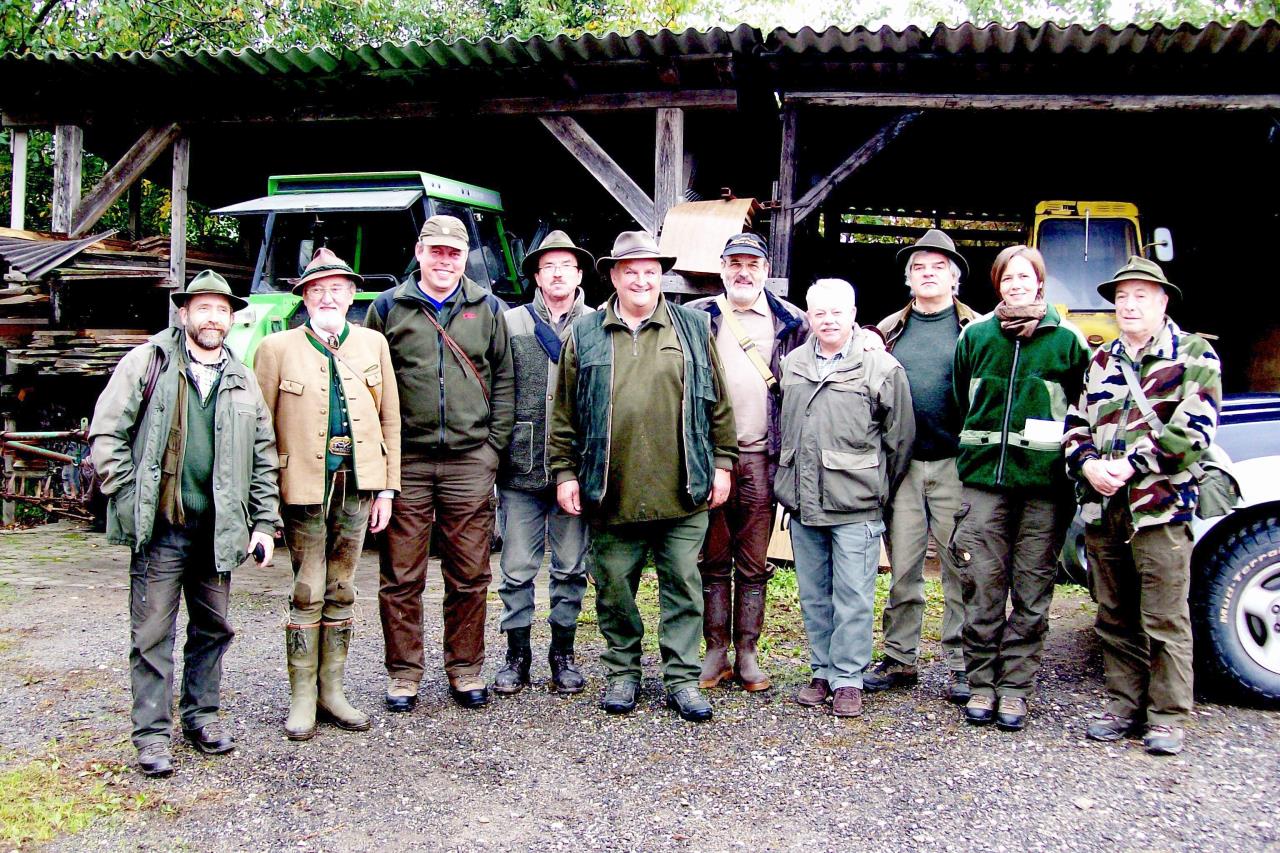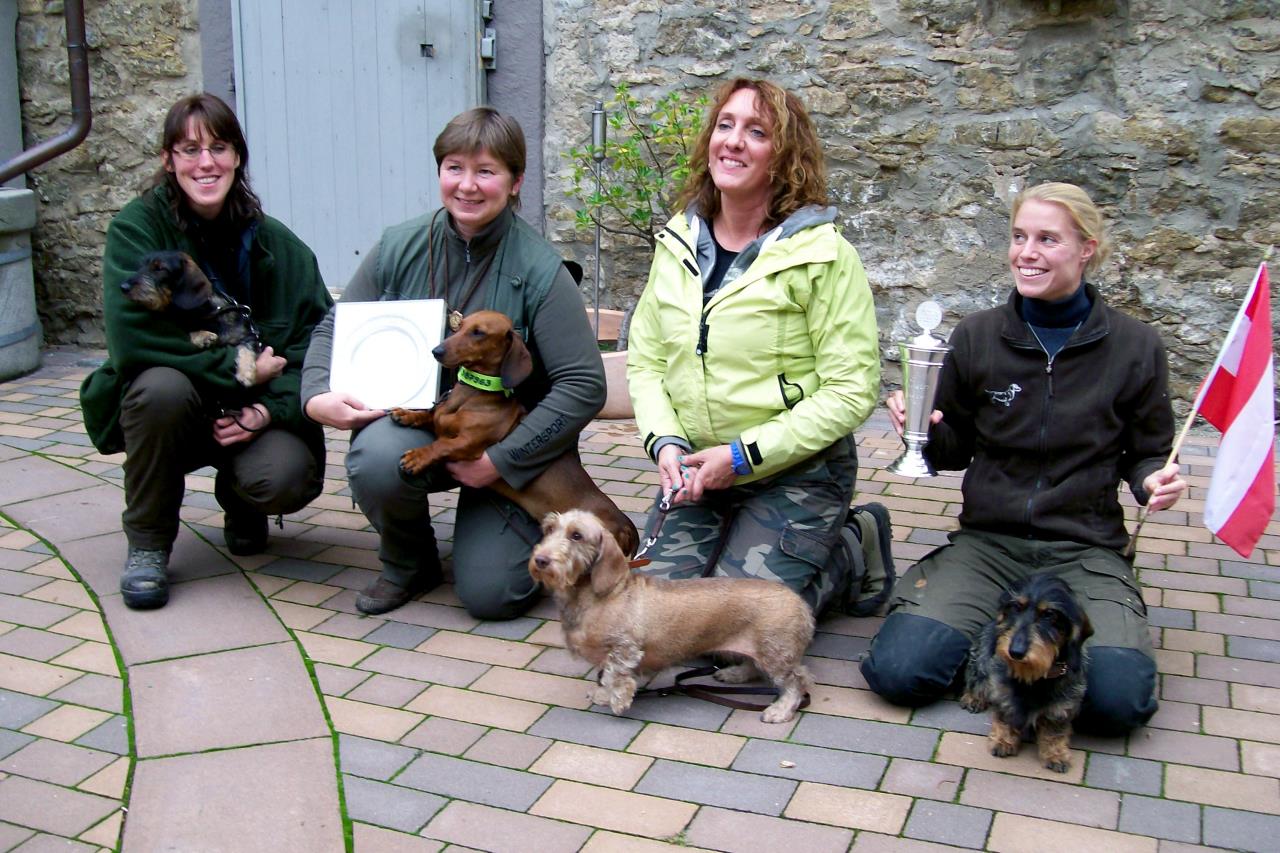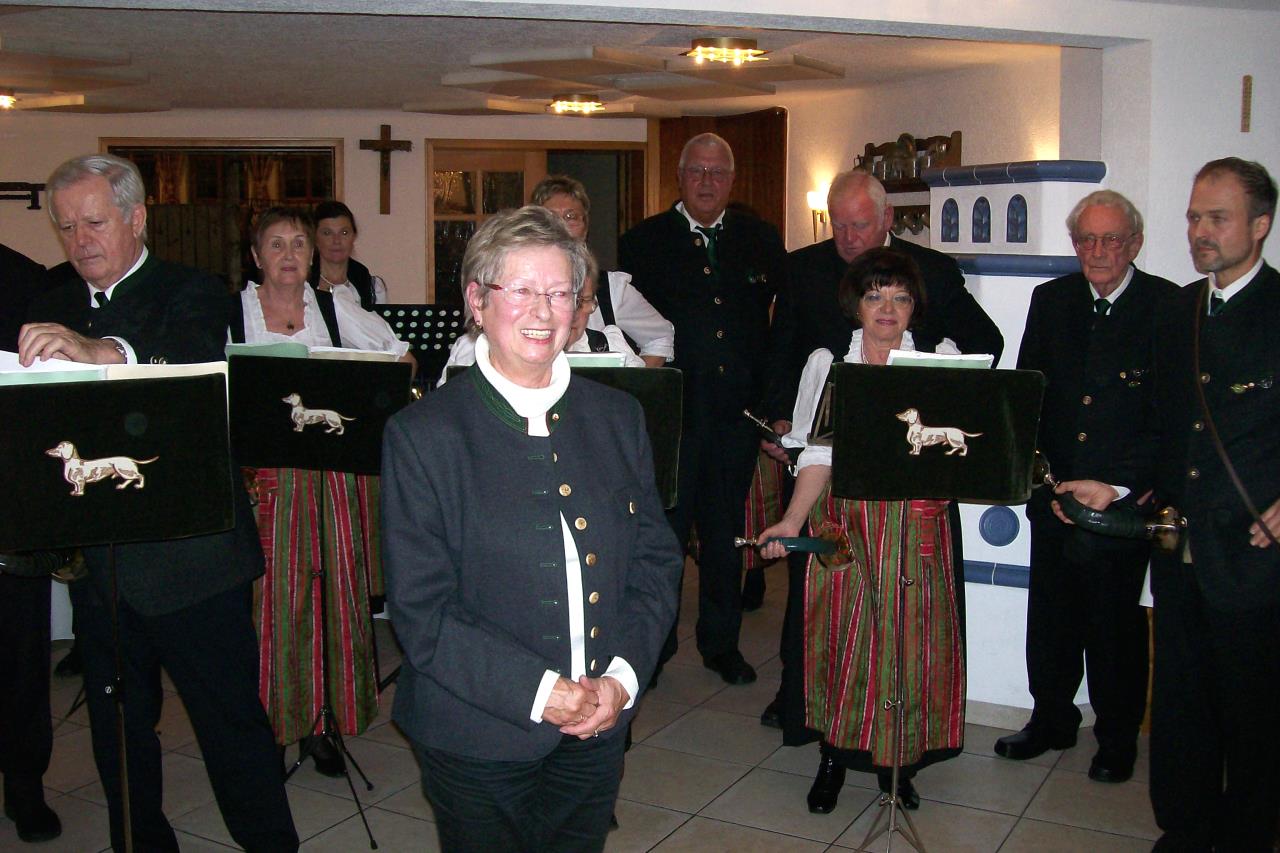The InterVGP (International Utility Test for Teckels) trial regulations approved
by the FCI General Committee were applied on 4 - 6 October 2013, with the North
Bavaria Dachshund Club (DCN), a member of the German Teckel Club, given the responsibility
of organising the trials. The trials were in the competent hands of DCN President,
Ms Ute Hellfeier and trial director Mr Reinhold Meyer. It is a demanding assignment
to set up and run a high-quality international competition, including a supporting
programme, starting from scratch. In addition to logistics, accommodation and catering
for a group of around 50, an internationally compatible artificial den was needed
for working below ground on predatory game, as well as a few hundred hectares of
woods for the blood tracking section and the search and flushing out of game. In
addition a watercourse suitable for dachshunds was needed for the water test. The
Steigerwald in Bavaria proved to be just the right venue for this high-ranking event,
as had already been seen back in 2000, the last time the European Dachshund Cup
was held there. The skills required included working a fox in the artificial den
before the shot (in accordance with animal welfare criteria and without direct contact),
and searching for game over a broad area in thickets above the ground in order to
flush it out, as well as a wide range of demands regarding the obedience of the
dogs. A further challenge was the work after the shot in the artificial blood tracking
discipline with a minimum laying time of 20 hours, without being accompanied by
the judges. If the handler and the dog lose the scent during this part of the trial,
they end up “out in the back of nowhere”, with nobody on the spot to offer assistance.
This makes it practically impossible to complete the trials successfully. The final
challenge was to retrieve a duck from deep water - a wet affair if any!


Richterkollegium mit Prüfungsleiter, v.l:
| |
| Jiri Cikryt | Delegierter CZ |
| Hans Ostermann | Präsident ÖDK |
| Steffen Maar | Obmann Jagdgebrauch DTK |
| Stefanus Middendorf | Präsident DTK/WUT |
| Klaus Schulz | Schliefenwart Kunstbauanlage DJTC |
| Robert Osterwalder | Präsident FCI-Erdhundekommission |
| Reinhold Meyer | Prüfungsleiter DCN |
| Antonio Palladini | Präsident ABC I |
| Katrin Maar | D |
| Xavier van den Eynden | Delegierter B |
Of the 15 teams entered, only 8 teams from Belgium, Italy, the Netherlands, Austria,
and the Czech Republic ultimately decided to face up to the challenging demands
set. Even before the trials had officially started on Friday evening, the organisers
found themselves confronted with a major problem. Although both the FCI trial regulations
and the invitation letter both clearly listed entry requirements (the dogs' scorecards),
the Hungarians had entered a team not complying with these. There were no two ways
about it – the team was not allowed to start. This led to the remaining three Hungarian
participants, two judges and a handler, deciding to boycott the trials. All four
headed back home on Saturday morning. 5 teams did not turn up, excusing themselves
in advance for various reasons. The organisers were lucky to be able to call up
two judges from amongst the spectators, meaning that the judging panel was again
back to full strength.
The trial requirements soon started whittling down the field, and at the end of
the first day three teams had failed to complete the blood tracking and one team
had failed the flushing out test, with the result that there were only four teams
at the start on Sunday for the working-below-ground and water tests. Happily all
four teams were able to successfully overcome this final hurdle.


Die vier erfolgreichen Amazonen mit ihren vier Hündinnen, v.l:
- Erika Gissing mit Kora
- Zdenka Leonhardtova mit Angie
- Monica Pagella mit Hanuta
- Clarissa Günnewig mit Desi
The international judging panel was made up of judges from six countries:
|
Xavier van den Eynden
|
Belgium
|
|
Katrin Maar
|
Germany
|
|
Steffen Maar
|
Germany
|
|
Stefanus Middendorf
|
Germany
|
|
Antonio Palladini
|
Italy
|
|
Hans Ostermann
|
Austria
|
|
Robert Osterwalder
|
Switzerland
|
|
Ulli Sand
|
Switzerland
|
|
Jiri Cikryt
|
Czech Republic
|
The practical section of the trials was completed at around 12:00 on Sunday, after
which it was time for the obligatory paperwork. The final result was announced after
lunch.
|
2013 winner
|
Wire-haired dachshund Desi derer zu Pempelfort, Clarissa Günnewig (AT)
|
276 points (CACIT)
|
|
2nd
|
Wire-haired dachshund Hanuta von der Bismarck-Eiche, Monica Pagella (IT)
|
263 points
|
|
3rd
|
Short-haired dachshund Angie Bella Morawia, Zdenka Leonhardtova (CZ)
|
240 points
|
|
4th
|
Wire-haired dachshund Kora z Oravskej Maguri, Erika Gissing (AT)
|
227 points
|


Präsidenmtin DCN Ute Hellfeier mit klubeigener Bläsergruppe
There was one incident that really shook up everybody - one participant lost hold
of the leash in the blood tracking event, with the result that the dog set off on
its own, ignoring the work demanded of it. The whole of Saturday was spent looking
for the dog. Without success. Sunday morning saw everyone available carefully searching
the part of the woods in question - this time successfully! After 24 hours the black-and-red
short-haired dachshund was found uninjured - the leash had become entangled in a
tree-trunk. This was certainly no pleasant experience for the dachshund, as there
had been heavy rain showers that Saturday. This incident nevertheless had a great
team-building effect. The most important event of this three-day competition, this
search for the missing dog had a happy end.
Conclusion: A young lady and her wire-haired dachshund bitch ended up taking the
prized CACIT (qualifying the dog for the FCI title of Champion Working Dog) back
with her to Austria. Indeed, two of the four finishing teams came from Austria.
All four teams were completely female, with both the handlers and the dogs belonging
to the "fairer sex". The men are going to have to start pulling up their socks -
fast. The DCN team did a great job of looking after the participating teams, and
the "Green Evening" event on Saturday, to the musical accompaniment of the DCN's
hunting horn ensemble, went down very well. This generous and heart-warming hospitality
certainly made the trip to Bavaria very worthwhile. A “Weidmannsdank” for the North
Bavaria Dachshund Club.
Robert Osterwalder
President of the FCI Earth Dog Commission